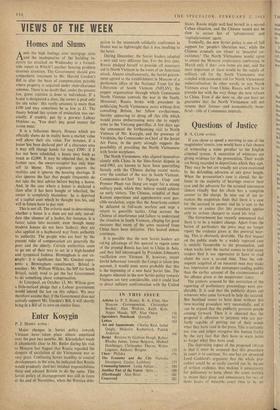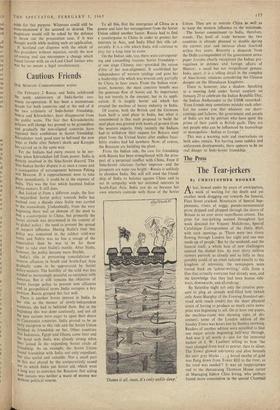Questions of Justice
R. A. CLINE writes:
If you chose to spend a morning in one of the magistrates' courts, you would have a fair chance of witnessing a scene peculiar to the English criminal system. A succession of witnesses are giving evidence for the prosecution. Their words are being recorded in depositions which they sign. They may be but are usually not cross-examined by the defending advocate at any great length. When the prosecution's case is closed, the de- fence in the majority of hearings reserve their case and the advocate for the accused announces almost ritually that his client has a complete answer to the charge. In nine out of ten in- stances the magistrate finds that there is a case for the accused to answer and he is sent to the sessions or assizes (for this procedure applies only to serious charges) to stand his trial.
The Government has recently announced that there is to be a modest change. Apart from the barest of particulars the press may no longer report the evidence given at this pre-trial hear- ing. This is obviously desirable. The first impact on the public made by a widely reported case is entirely favourable to the prosecution, and when weeks later the matter comes to trial many readers find it too oppressive to have to read about the case a second time. Thus the sub- sequent acquittal of an innocent man may make less impression on the newspaper-reading public than the earlier account of the circumstances of the offence given at the magistrates' court.
The protests aroused by this restriction of the reporting of preliminary proceedings were pre- dictable. It is said that the publicity draws out witnesses who conic forward to help the accused. But Scotland seems to have done without this time-wasting procedure very successfully, and it can be argued that the publicity prevents people coming forward. Then it is objected that the proposal is offensive to jurymen who arc per- fectly capable of putting out of their minds what they have read in the press. This is certainly not true and judges recognise this human frailty by the very fact that they have to warn juries to forget what they have read.
The depressing aspect of the proposed ref min is that it must be assumed that this procedure in court is to continue. No one has yet answered Lord Goddard's argument that the whole pro- cedure could be as easily carried out by means of written evidence, thus making it unnecessary for policemen to hang about the court waiting to intone their piece and unnecessary for two or three hours of valuable court time to he .et
aside for this purpose. Witnesses could still be cross-examined if the accused so desired. The magistrate would still be asked by the defence to throw out the prosecution case, if it was thought worth while making such an application.
II' Scotland can dispense with the whole of this procedure without injustice, surely the new reforming zeal can encompass a change which found favour with an ex-Lord-Chief Justice who was by no means a legal revolutionary.



































 Previous page
Previous page